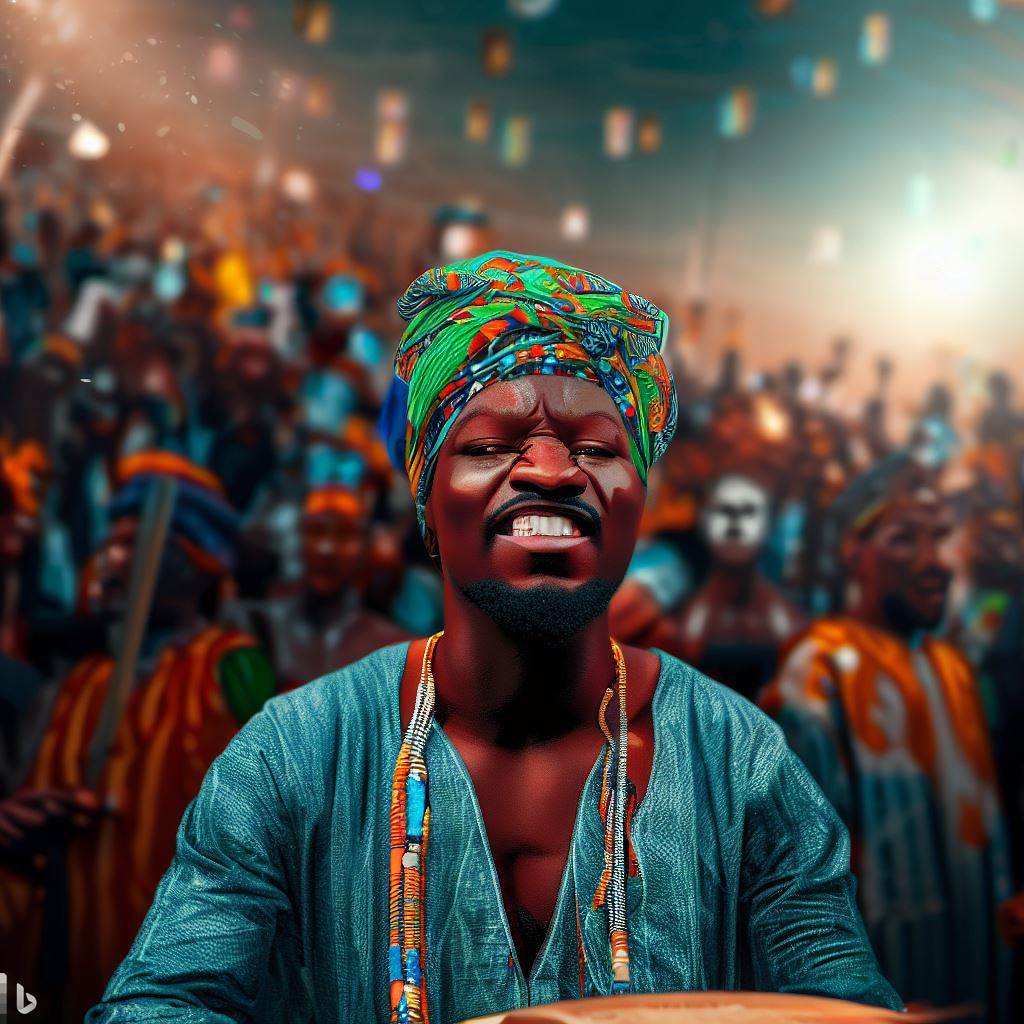Introduction
Music festivals and cultural events in Nigeria offer a glimpse into the vibrant and diverse cultural tapestry of this West African nation.
These events serve not only as platforms for entertainment but also play a crucial role in promoting Nigerian culture and boosting tourism.
One of the key reasons why music festivals and cultural events are vital in Nigeria is their ability to showcase the country’s rich cultural heritage.
From traditional music and dances to local cuisines and fashion, these events provide an immersive experience into the country’s traditions and customs.
Furthermore, music festivals and cultural events serve as platforms for emerging and established Nigerian artists to showcase their talent.
The events offer opportunities for musicians, dancers, and artists to perform and gain recognition, contributing to the growth of the creative industry in Nigeria.
In addition to promoting Nigerian culture, music festivals and cultural events significantly contribute to the country’s tourism sector.
Tourists from all over the world are attracted to Nigeria to witness these festivals and experience the vibrant atmosphere firsthand.
This influx of tourists not only boosts local businesses but also helps in promoting Nigeria as a must-visit destination.
Overall, music festivals and cultural events in Nigeria are essential in preserving and promoting the country’s rich cultural heritage while attracting tourists.
These events create a sense of pride among Nigerians and contribute to the overall development of the country’s tourism industry.
Historical Background
A Brief history of music festivals in Nigeria
Music festivals in Nigeria have a rich history that dates back several decades. They emerged as a platform to celebrate the vibrant musical culture of the country.
Nigerian music festivals played a crucial role in promoting indigenous music genres and providing a platform for musicians to showcase their talent.
These festivals were often organized by local communities or cultural organizations and were characterized by vibrant performances, colorful costumes, and traditional dances.
Evolution of cultural events showcasing Nigerian traditions and arts
Alongside music festivals, cultural events in Nigeria have also experienced significant evolution over the years.
These events serve as platforms for showcasing the nation’s diverse traditions and arts, encompassing various aspects of Nigerian culture such as dance, visual arts, drama, literature, and traditional craftsmanship.
In the early years, cultural events were primarily centered around traditional ceremonies, such as weddings, initiation rites, and harvest festivals.
These events were deeply rooted in indigenous customs and aimed to preserve and promote Nigerian cultural heritage.
They were often organized within local communities and provided opportunities for individuals to learn about their cultural roots.
Over time, the scope of cultural events expanded to include larger-scale festivals and cultural showcases.
In the 20th century, with the influence of globalization, Nigerian cultural events started incorporating contemporary elements, combining traditional practices with modern influences.
This evolution allowed for the fusion of traditional art forms with more contemporary expressions, resulting in a unique and dynamic cultural scene.
Today, Nigeria boasts a diverse range of music festivals and cultural events that attract both local and international audiences.
Traditional music festivals, such as the Calabar Carnival and Eyo Festival, continue to showcase Nigerian music, dance, and costumes, while also serving as tourist attractions.
Additionally, modern music festivals, such as the Lagos International Jazz Festival and Felabration, celebrate contemporary music genres and showcase Nigeria’s position as a hub for musical creativity.
Furthermore, the rise of cultural events in Nigeria has contributed to the recognition and preservation of the country’s artistic traditions.
These events provide a platform for artists, artisans, and performers to share their talents and skills with a wider audience.
They have also played a crucial role in encouraging the younger generation to appreciate and engage with Nigerian cultural heritage, fostering a sense of national pride and identity.
Read: The Role of Record Labels in Nigerian Music
Popular Music Festivals in Nigeria
Description of major annual music festivals in Nigeria
- Felabration: A yearly festival that celebrates the life and music of the legendary Nigerian musician Fela Kuti.
- Lagos International Jazz Festival: An annual event that brings together local and international jazz artists.
- Calabar Carnival: Although not solely a music festival, it features music performances and showcases Nigerian music and culture.
Importance of music festivals in promoting Nigerian music and artists
Music festivals play a crucial role in promoting Nigerian music and artists by providing a platform for exposure, encouraging creativity, and fostering cultural exchange.
- Exposure: Music festivals attract a diverse audience, including music lovers, industry professionals, and media. This exposure helps emerging Nigerian artists gain recognition and build a fan base.
- Creativity: Music festivals encourage artists to experiment and showcase their unique styles, leading to the development of new genres and trends within the Nigerian music industry.
This experimentation fosters creativity and innovation. - Cultural Exchange: Nigerian music festivals often feature international artists, allowing for cultural exchange and collaboration.
This exposure to diverse musical influences helps Nigerian artists broaden their perspectives and ensures the growth of a global Nigerian music scene. - Economic Impact: Music festivals generate economic benefits by attracting tourists and creating job opportunities.
Local businesses benefit from increased demand for accommodation, food, transportation, and entertainment services during these events. - Tourism Promotion: Music festivals act as a tourism magnet, drawing visitors from both within and outside Nigeria.
Tourists attending these events get to experience the vibrant Nigerian music scene and contribute to the local economy. - Promoting National Unity: Music festivals provide a platform for Nigerians from different ethnic backgrounds to come together and celebrate their shared love for music.
This promotes unity and strengthens the country’s sense of national identity. - Platform for Industry Networking: Music festivals create opportunities for artists, music industry professionals, and stakeholders to network and form collaborations.
These connections facilitate growth and development within the Nigerian music industry. - Showcasing Cultural Heritage: Nigerian music festivals often incorporate cultural elements, allowing artists to showcase Nigeria’s rich cultural heritage.
This helps preserve and promote traditional music, dance, costumes, and folklore.
In fact, music festivals in Nigeria such as Felabration, Lagos International Jazz Festival, and Calabar Carnival serve as important platforms for promoting Nigerian music and artists.
They offer exposure, encourage creativity, foster cultural exchange, boost the economy, and promote national unity.
These festivals play a crucial role in shaping and expanding the Nigerian music industry both locally and on a global scale.
Read: Cinematography: Past and Present in Nigerian Cinema
Cultural Events in Nigeria
Listing and description of traditional cultural events in Nigeria
1. Eyo Festival
The Eyo Festival is a cultural event unique to Lagos state and celebrated by the people of Lagos Island.
It is a masquerade procession involving costumed dancers known as “Eyo” adorned with white flowing robes and hats.
The festival has deep historical and cultural significance and is usually held to honor important personalities or to celebrate special occasions.
2. Osun-Osogbo Festival
The Osun-Osogbo Festival is an annual religious and cultural event celebrated in Osun state. It is held in honor of the river goddess Osun, believed to have healing powers and the ability to grant wishes.
The festival includes a grand procession, traditional rituals, artistic performances, and the reenactment of historical events.
3. New Yam Festival
The New Yam Festival, also known as Iri Ji, is a harvest festival celebrated by various ethnic groups in Nigeria. It is typically held in August or September and marks the beginning of the harvest season.
The festival is characterized by the offering of yam tubers to the gods and ancestral spirits, cultural displays, masquerade dances, and feasting.
Cultural events as a reflection of Nigeria’s diverse ethnic groups and traditions
Nigeria is a country known for its rich cultural diversity with over 250 ethnic groups, each having its unique traditions and cultural practices.
Cultural events serve as a platform to showcase and preserve these traditions, promoting unity and understanding among the different ethnic groups.
These events provide an opportunity for Nigerians to come together in celebration, showcasing diverse dances, music, costumes, and art forms.
They are a vibrant display of the country’s cultural heritage, allowing participants and spectators to experience the rich traditions and customs firsthand.
Through cultural events, Nigerians get to appreciate the beauty and significance of their cultural heritage, promoting cultural pride and a sense of identity.
These events also attract tourists from all over the world, contributing to the growth of the tourism industry and the country’s economy.
Moreover, cultural events act as a means of passing down traditions from one generation to another.
The younger generation learns about their cultural roots and gains a deeper understanding of their identity through participation in these events.
It helps in preserving and promoting the customs and values that make Nigeria a diverse and culturally vibrant nation.
In short, traditional cultural events in Nigeria such as the Eyo Festival, Osun-Osogbo Festival, and New Yam Festival play a vital role in preserving and showcasing the country’s rich cultural heritage.
These events not only celebrate and honor traditions but also serve as a reflection of Nigeria’s diverse ethnic groups and their unique cultural practices.
By participating in these events, Nigerians gain a deeper appreciation of their cultural identity and promote unity among different ethnic groups.
Read: Top Nigerian Cinematographers: An In-depth Review

Economic and Tourism Impact
Economic benefits of music festivals and cultural events in Nigeria
- Music festivals and cultural events in Nigeria have significant economic benefits for the country.
- These events attract a large number of attendees, both locals and tourists, boosting the local economy.
- Local vendors, hotels, and restaurants experience increased business during these festivals.
- The events create job opportunities for local musicians, artists, event planners, and support staff.
- The revenue generated from ticket sales, food and beverage sales, and merchandise contributes to the economic growth.
- Music festivals and cultural events also provide opportunities for local entrepreneurs to showcase their products and services.
- This exposure can lead to increased sales and business opportunities for these entrepreneurs.
- Furthermore, these events often require infrastructure development, leading to investment in the local economy.
- Construction of stages, sound systems, and other facilities contribute to the growth of local industries.
- Overall, music festivals and cultural events in Nigeria have a positive impact on the economy by creating jobs and stimulating business.
Increase in tourism as a result of music festivals and cultural events
- Music festivals and cultural events in Nigeria have a significant impact on tourism in the country.
- These events attract both domestic and international tourists who are interested in experiencing Nigerian culture.
- Tourists attend these festivals to witness the vibrant music, traditional dances, and unique art forms of Nigeria.
- This influx of tourists contributes to the growth of the tourism industry.
- Hotels, guesthouses, and other accommodation facilities benefit from increased occupancy rates during these events.
- Tourists also spend money on local transportation, restaurants, souvenirs, and other tourist activities.
- Local tour operators and travel agencies organize packages and tours around these festivals, attracting more visitors.
- These events serve as platforms for showcasing Nigeria’s cultural heritage, attracting tourists interested in cultural tourism.
- Nigeria’s reputation as a cultural hub is enhanced through these events, attracting more tourists in the long run.
- Increased tourism leads to foreign exchange earnings, which further boosts the country’s economy.
In a nutshell, music festivals and cultural events in Nigeria have both economic and tourism impacts. These events generate revenue, create job opportunities, and stimulate local businesses.
Additionally, they attract tourists who contribute to the growth of the tourism industry.
The cultural richness and diversity showcased during these festivals make Nigeria an attractive destination for both domestic and international visitors.
Read: Music Training and Education in Nigeria Explored
Explore Further: Innovative Hair Techniques in Nigeria’s Film Industry
Discover More: Exploring Artists’ Agent Career: A Nigerian Perspective
Challenges and Future Prospects
Issues such as funding, infrastructure, and security
- Funding has been a major challenge for music festivals and cultural events in Nigeria.
- Organizers often struggle to secure financial support from government bodies and corporate sponsors.
- This lack of funding hampers the growth and success of these events.
- Furthermore, the inadequate infrastructure poses another obstacle for organizers.
- Venues need to be equipped with proper facilities to accommodate large crowds and ensure safety.
- Without adequate infrastructure, event logistics become challenging, impacting the overall experience for attendees.
- Security is another pressing concern for music festivals and cultural events in Nigeria.
- Organizers must invest in robust security measures to ensure the safety of participants.
- Addressing these issues requires collaboration between event organizers, government bodies, and corporate sponsors.
- Implementing clear funding policies, improving infrastructure, and enhancing security measures are crucial steps that need to be taken.
Opportunities for growth and expansion in the music festivals and cultural events industry
- Despite the challenges, the music festivals and cultural events industry in Nigeria hold immense potential.
- The rich cultural heritage and diverse music genres provide a unique platform for growth.
- As music festivals gain popularity, there is an opportunity to generate revenue from ticket sales and sponsorships.
- These events also contribute to the local economy by boosting tourism and creating job opportunities.
- By showcasing Nigerian talent, music festivals and cultural events promote the country’s cultural exports.
- With the right support and investment, the industry can thrive and become a significant contributor to Nigeria’s economy.
- Moreover, there is scope for expansion beyond traditional music festivals, such as incorporating other art forms.
- By diversifying the offerings, these events can attract a broader audience and cater to different interests.
- Collaborations with international artists and cultural exchange programs can further enhance the reach and impact of these events.
- Embracing technology and incorporating digital platforms can also open new avenues for growth and audience engagement.
In general, while challenges such as funding, infrastructure, and security persist in the music festivals and cultural events industry in Nigeria, there are significant opportunities for growth and expansion.
By addressing these challenges and tapping into the rich cultural heritage, the industry can flourish, contributing to the economy and promoting Nigerian talent on a global scale.
Conclusion
Music festivals and cultural events in Nigeria hold significant importance in showcasing and celebrating the country’s rich heritage.
It is crucial to encourage support and active participation in preserving Nigerian culture by attending these festivals and events.
Recap of the significance of music festivals and cultural events in Nigeria:
- Music festivals and cultural events showcase Nigeria’s rich and diverse heritage.
- They promote unity and cultural exchange among different ethnic groups.
- These events provide a platform for emerging talents and established artists to shine.
- Music festivals boost tourism, stimulate the economy, and create employment opportunities.
- They preserve and celebrate traditional customs, music, dance, and art forms.
Encouraging support and participation in preserving Nigerian culture through attending festivals and events
- Attend and Participate: Engage actively in festivals to experience the cultural tapestry of Nigeria.
- Support Local Artists: Attend events to encourage and appreciate Nigerian musicians and performers.
- Promote Diversity: Share your festival experiences to foster cultural understanding and appreciation.
- Preserve Heritage: By attending, you contribute to the preservation of Nigeria’s unique cultural traditions.
- Economic Impact: Your participation bolsters local economies and promotes cultural tourism.
- Unite Through Culture: Festivals strengthen national unity by celebrating Nigeria’s cultural diversity.
Finally, music festivals and cultural events are more than entertainment; they are a celebration of Nigeria’s identity and heritage.
Your support and participation play a vital role in preserving and promoting this rich cultural tapestry.




